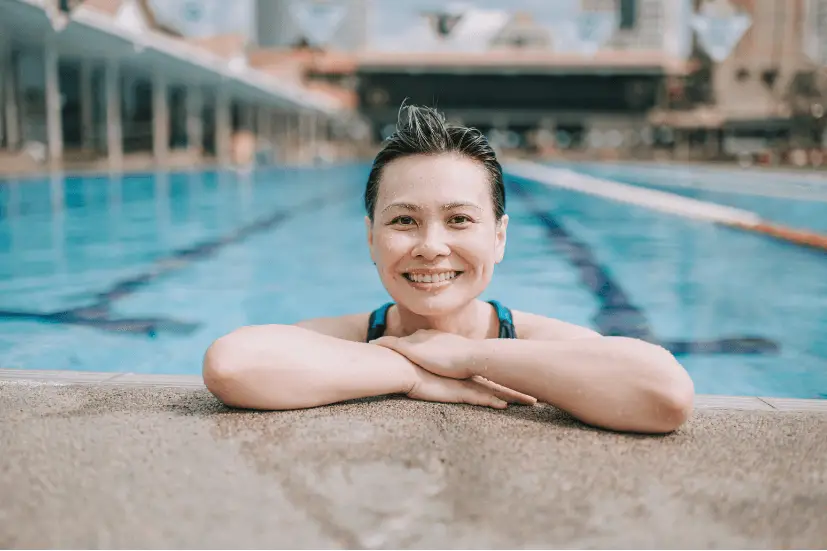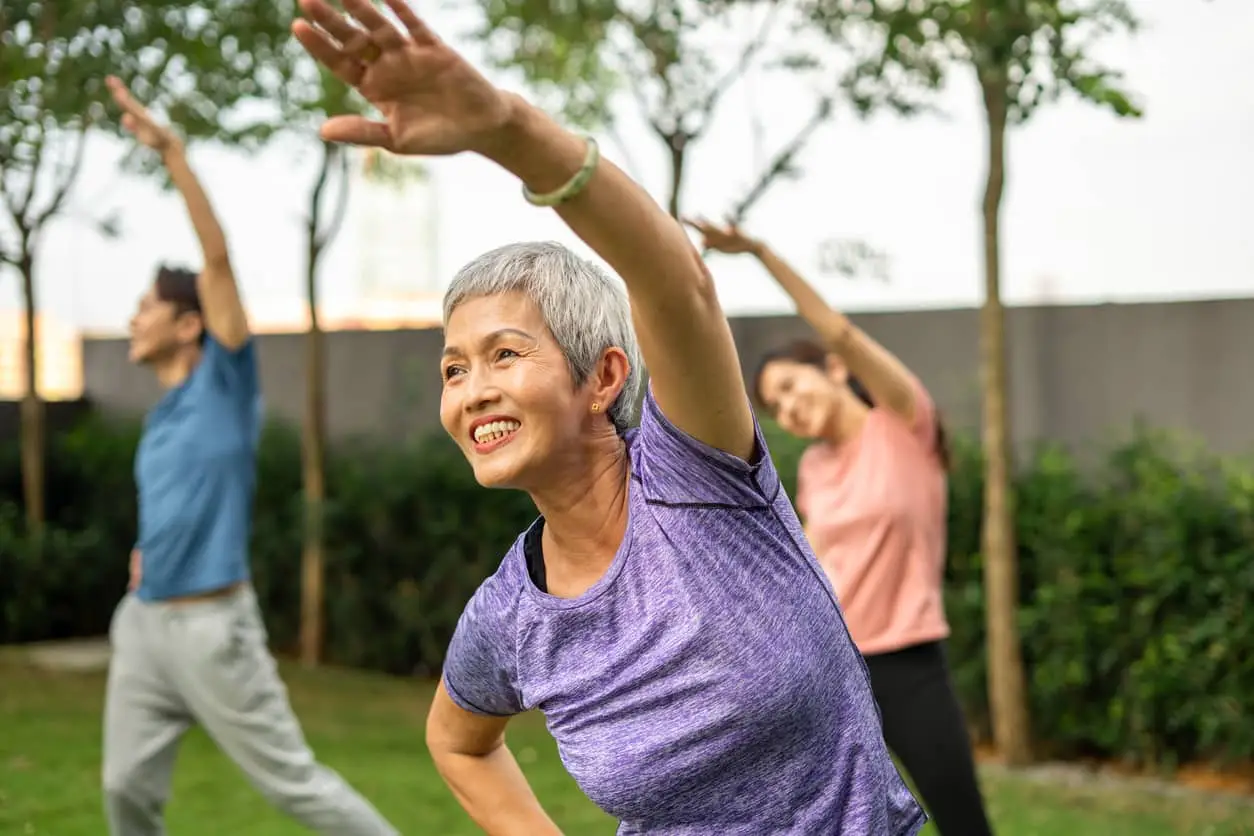How to Age Gracefully and Stay Healthy: 10 Tips for Ladies

After a certain age, ageing usually becomes a concern for many. This is especially so for women, as changes in physical appearances become more apparent with wrinkles and age spots starting to appear.
But there’s so much more to ageing than how we look. It's also about feeling confident as you get older, while ensuring that you have the means to fully enjoy life.
If you too would like to learn how to age gracefully, read on for tips on achieving it through small changes to your lifestyle and some planning.
1. Maintain a Balanced Diet
Many of us are guilty of getting carried away with the busy-ness of work and family life, which may lead us to neglect our diets. However, a nutritious diet is essential for good health and is key to well-being.
According to the World Health Organization (WHO), a healthy diet can help to protect you against many chronic diseases such as heart disease, diabetes, cancer, and reduce the risk of Alzheimer’s disease. For women, certain vitamins and minerals are especially important. For example, calcium helps with osteoporosis which women are more prone to, and whole-food diets can help alleviate the symptoms of menopause.
Try this: To learn how to age gracefully, incorporate foods that can enhance your overall well-being. Let's explore some nutritional stars that contribute to ageing gracefully:
- Avocados: Their healthy fats and essential nutrients not only promote heart health but also contribute to supple, hydrated skin, making them an ideal food for graceful ageing.
- Broccoli: Brimming with vitamins, minerals, and antioxidants, its benefits for bone health are crucial for ageing well.
- Fatty fish: Salmon and mackerel, for example, are abundant in omega-3 fatty acids that support skin health.
- Nuts: Almonds and walnuts are a nutritional powerhouse, supporting brain health and balanced cholesterol levels, both important factors in overall wellness in later years.
- Dairy products: Dairy products are rich in essential nutrients, including calcium, potassium, and vitamin D, which are particularly important as we age. Enjoy yoghurt as a snack or breakfast, add cheese to dishes for extra flavour, and use milk in cereals or smoothies.
2. Exercise Regularly
As we advance in years, it's common to encounter physical challenges. For instance, many people experience a loss in bone mass and a slower metabolism as they age, leading to increased fat storage. However, engaging in regular exercise can significantly mitigate these issues and keep you healthy.
When done regularly, exercise can significantly lower our risk of diseases, such as heart disease and diabetes, and help us to better retain our mobility. An active lifestyle can also aid in lowering stress levels and improving sleep quality, as well as general mental health. Some exercises that are said to be good for women, especially those around their 50s, are strength training, stretching, jogging and swimming. For example, strength training improves strength and posture by helping to maintain bone strength and reducing the risk of lower back injury. Stretching aids in maintaining flexibility in the joints which tend to harden as we age. Finally, exercises such as walking, jogging and swimming are good for the cardiovascular system, which is beneficial for heart health.
Try this: Try incorporating three instances of simple exercise into your day, like walking home from the train station instead of taking the bus, or brisk walking as you run your errands. If you are up for new challenges, you can also try something new, such as spin class, pilates, or muay thai. For encouragement, consider using a fitness tracker to remind you to do and log your workouts, or find a fitness buddy! Remember, exercise is more than just about losing weight – it also helps to boost your health and overall well-being!
3. Get Sufficient Sleep
In this fast-paced world, the value of sleep is often overlooked, neglecting sleep can take a toll on our bodies – both physically and mentally. Some serious issues that can be associated with sleep deprivation are high blood pressure, diabetes and various heart problems. It can also affect mental health, causing irritability and anger, and reduce your ability to deal with stress.
Embracing how to age gracefully means recognising that sufficient and quality sleep is crucial for maintaining overall well-being. A plus point is that studies have shown that well-rested people tend to have brighter complexions, clearer skin and fewer wrinkles.
Try this: Target to clock in seven to eight hours daily and establish a consistent sleep/wake schedule. For better quality of sleep, avoid screen time at least an hour before your bedtime. If you have trouble falling asleep, try meditating or reading a book to calm your mind. If you are a parent of a young child and sleeping through the night is out of the question, try getting short naps in the day for that energy boost.
4. Drink Plenty of Water
This may sound simple, but it’s true, and unfortunately, often overlooked. The health benefits of drinking enough water are aplenty – higher energy levels, better digestion, normalised blood pressure, healthy electrolyte balance, hydrated skin and more!
Try this: Drink at least eight glasses of water every day. Of course, note that this is an estimated figure and required amounts may vary, based on your needs and activities. For example, if you exercise frequently and at high intensity, you may need to increase your water intake. Staying hydrated is a simple yet effective way to support your journey in learning how to age gracefully.
5. Take Care of Your Skin
For women, understanding how to age gracefully involves paying attention to the changing needs of your skin. As we age, our skin experiences changes such as reduced elasticity, dryness, and the appearance of fine lines and age spots. However, with the right approach, you can maintain your skin’s health and radiance.
For example, as the skin tends to become drier with age, incorporating a rich, hydrating moisturiser into your daily regimen is crucial. Look for products containing ingredients like hyaluronic acid, glycerin, or ceramides. These ingredients help lock in moisture, keeping the skin plump and reducing the appearance of fine lines.
Try this: Have a skincare routine that includes gentle cleansing, hydrating moisturisers, and broad-spectrum sun protection. Experiment with key active ingredients like retinoids and peptides, but be mindful of your skin's responses and adjust accordingly. Make gentle exfoliation a part of your routine, but limit it to once or twice a week to prevent irritation.
6. Enjoy Your Hobbies
With our responsibilities at home and in the workplace, we may sometimes lose touch with what fuels our happiness. However, we should not forget the importance of having some me-time, doing things we enjoy which can help us to decompress after a long day of work. This can lift our moods significantly, giving us the boost we need to go about our everyday lives.
Try this: Do something you enjoy! Spend time in nature, revisit old hobbies, pursue new ones, or volunteer – anything that brings you joy. You could, for example, spend your day hiking at Sungei Buloh Nature Reserve with your loved ones. Or think about something that you’ve always loved or was interested in doing, that you might have had to give up along the way to make time for your commitments. It could be anything, for example music, sports, cooking or something techie – just do it!
7. Stay Socially Connected
Staying in touch with loved ones is another great way to boost your mental well-being especially through life’s ups and downs. Building and maintaining healthy relationships with friends, family, and the community provides a support system, enriches life experiences, and fosters a sense of belonging.
Having a social network helps to reduce stress, increase feelings of happiness and self-worth, and more. In particular, it helps to have friends who are going through similar phases of life so that you can relate and support one another.
Participating in shared activities, offering support, and maintaining open communication are vital in nurturing these relationships. These connections not only bring joy and comfort but also contribute to emotional stability and resilience.
Try this: Organise a monthly get-together with friends or family. It could be a simple dinner, a movie night, or a group hobby session. Regular interaction strengthens bonds and contributes to emotional stability.
You can also try finding activities you and your friends or family can enjoy together such as high tea, escape rooms, or fun workshops – the sky’s the limit!
8. Embrace Positive Mental and Emotional Well-being
Positive mental and emotional well-being can also make a remarkable difference. This includes effectively managing stress, taking care of mental health, and nurturing positive relationships, all of which can contribute to overall well-being and enable one to age with grace and vitality.
Mental Health
Just as important is maintaining robust mental health. Your mental health shapes your perception of the world, your interactions with others, and your decision-making processes. To ensure your mental well-being, it is vital to engage in activities that bring you joy and satisfaction. Pursuing hobbies, enjoying moments of tranquillity, or seeking professional support when necessary can significantly enhance your mental state. Regular self-reflection and mindfulness also play a pivotal role in understanding and catering to your mental health needs.
Try this: Start a gratitude journal. Each day, write down three things you are grateful for. This simple act can shift your focus to the positive aspects of life and improve your mental health.
Stress Management
In the whirlwind of daily life, stress can sneak up on you, impacting your physical and mental states. While it is impossible to avoid stress entirely, managing it effectively is key to ageing gracefully.
Try this: Set aside time each day for a relaxing activity, whether a short walk or simply sitting quietly with a cup of tea. Consider using an app that guides you through meditation or breathing exercises, making it an easy and accessible practice.
9. Be Proactive with Your Health Check-ups
Regular health check-ups, screenings, and preventive care are essential for women looking to age gracefully. Early detection of diseases such as breast cancer, colorectal cancer, osteoporosis, and heart conditions can increase the effectiveness of treatment and management, ultimately enhancing quality of life. For women aged 40 and above, regular monitoring becomes increasingly important. According to the Health Assessment Centre at Singapore General Hospital (SGH), it is recommended to undergo a fasting blood glucose test once every three years to monitor for diabetes mellitus. This age group should also consider a fasting lipids test with the same frequency to keep an eye on cholesterol levels, crucial for heart health. Additionally, annual clinical breast exams and mammograms should be an essential routine to facilitate early detection of breast cancer.
The health screening regimen evolves for women as they cross the 50-year mark. While the mammogram frequency might be adjusted to once every two years, it remains a critical component in the vigilant monitoring of breast cancer. Colorectal cancer screening becomes a new addition to your health checklist, including a yearly faecal immunochemical test (FIT) and a colonoscopy. If initial tests are negative, a computed tomography (CT) colonography might be suggested once every five years or per the doctor’s advice.
For those advancing into their 65s and beyond, attention shifts to other aspects of health. Regular Bone Mineral Density (BMD) scans are recommended to check for signs of osteoporosis, which grows more common with age. Regular eye exams using a Snellen chart are also advised to monitor for changes in vision and overall eye health, with the frequency determined by a healthcare professional.
Try this: Commit to schedule regular health check-ups and screenings as recommended by your healthcare provider. These health screenings can be vital in early detection and preventive healthcare.
10. Plan for Retirement
Aside from all the physical and social concerns that you might have when it comes to ageing, don’t forget that it’s also important to think about your financial health and save for retirement. After taking steps to put yourself in the best physical, mental and emotional health, it’s important to be sure that you’ll be able to support a good quality of living as you move into your next phase of life – whether it’s through savings, investments, or building passive income streams. Take care of this early, so that when you’re older, you’ll have the peace of mind to focus on living your best life.
Try this: Start financial planning for your golden years so you can secure your dream retirement lifestyle. Check out Income's Gro Retire Flex Pro II to enjoy a steady income stream when you retire. Receive monthly cash payouts1 during your retirement, providing an illustrated total yield at maturity of up to 4.08% p.a.2,3. You can choose your premium payment terms and payout period to suit your budget and retirement needs. You may even choose to adjust when your cash payouts1 begin by up to 5 years4,5 if you decide to retire earlier or later.
For many women, it is natural to worry about the challenges and uncertainties of ageing. However, there are many ways that can guide you on how to age gracefully and healthily, so that you can continue to enjoy quality of life. With the right care, the best is yet to come. Here’s to ageing gracefully, ladies!
1 The cash payout consists of a monthly cash benefit and a non-guaranteed cash bonus.
2 This is for illustration purposes only. The total yield at maturity is not guaranteed and is based on the assumption that the Life Participating Fund earns a long-term average return of 4.25% per annum for a male non-smoker, aged 40, who chooses a retirement age of 70, a payout period of 20 years and pays a single premium. It is also based on the assumption that all cash benefits and non-guaranteed cash bonuses due for the entire policy term are paid out to the policyholder. Based on the illustrated investment rate of 3.00% per annum, the total yield at maturity will be up to 2.97% per annum.
3 The figures in the illustration are not guaranteed and are illustrated based on the assumption that the Life Participating Fund earns a long-term average return of 4.25% per annum in the future. Returns are illustrated based on estimated bonus rates that are not guaranteed. The actual benefit payable will vary according to the future performance of the Life Participating Fund. The calculation for the illustrated total yield at maturity also assumes that all cash benefits and non-guaranteed cash bonuses due for the entire policy term are paid out to the policyholder.
4 The policyholder may choose to shorten or extend the accumulation period, by up to 5 years, in multiples of 1 year.
The request to exercise this option must be made on a date:
a) At least 2 years after the policy entry date; and
b) At least 2 years before the end of your original or revised accumulation period, whichever is earlier.
Other terms apply for this benefit. Please refer to the policy conditions for further details.
5 Please note that your policy benefits (including cash benefits, death benefit and surrender value), bonuses (if any) and riders (if any) may change if you change the accumulation period and/or payout period. You may request your financial advisor representative to generate the policy illustration for a different accumulation period and payout period to understand the changes in the policy benefits.
This article is meant purely for informational purposes and does not constitute an offer, recommendation, solicitation or advise to buy or sell any product(s). It should not be relied upon as financial advice. The precise terms, conditions and exclusions of any Income Insurance products mentioned are specified in their respective policy contracts. Please seek independent financial advice before making any decision.
These policies are protected under the Policy Owners’ Protection Scheme which is administered by the Singapore Deposit Insurance Corporation (SDIC). Coverage for your policy is automatic and no further action is required from you. For more information on the types of benefits that are covered under the scheme as well as the limits of coverage, where applicable, please contact Income Insurance or visit the GIA/LIA or SDIC websites (www.gia.org.sg or www.lia.org.sg or www.sdic.org.sg).
This advertisement has not been reviewed by the Monetary Authority of Singapore.
Related Articles





